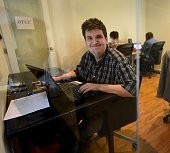In an advanced research, it was found that with the help of new technology, vocal characteristics for Autism Spectrum Disorder or ASD can be diagnosed.
In an article published in ScienceNordic, it is stated that as of now, there are several indicators in use to diagnose autism in children. Some of the most commonly identified are - lack of skills, poor communication skills and routine behavior tricks.
Autism diagnosis has always been based on observing behavior in children and psychiatric valuation.
Autismspeaks recommends to encourage and inspire children to build skills that include tips on how to behave, cope with disappointment, dealing with alternative choices and behavioral therapy.
Some of the best tips to enjoy a holiday during Thanksgiving Day with a child who has autism:
-
Follow convenient dressing style that does not cause discomfort.
-
Choose an appropriate volume for music, TV and conversations to avoid the child coming under overstimulation.
-
Entertain quiet room to relax and to get busy with independent exercises.
In an attempt to improve autism clinical diagnosis, 'machine learning method' has been introduced to analyse tone, pauses, press in people's voices.
According to Riccardo Fusaroli, an associate professor in Cognitive Science at the Interacting Minds Center and at the School of Communication and Culture, Aarhus University, Denmark, there is more need to introduce open methods to research for ASD voice patterns.
"It's possible to separate people with Autism Spectrum Disorder from neurotypical people using machine learning methods, with 70 to 96 per cent accuracy" Riccardo says.
"It shows that voice and prosody are potentially rich indicators of cognitive and clinical features, and thus could support clinicians in the screening and diagnostic process," he says.
ASD recognizes some of the most common diagnoses - Infantile autism, Atypical autism, Profound Developmental Disorder second, Asperger's Syndrome.
Alternatively, Kristine Jen, a professor in developmental psychology at the Center for Developmental & Applied Psychological Science at Aalborg University, Denmark, disagrees with the continuation of research into vocal characteristics as an indicator of ASD.
"It's a much more complicated disorder that takes many forms and can affect people in many different ways. I have difficulties imagining that the voice could be an indicator," Lopez says.
"I don't think we need this type of new technology to assist [diagnoses],"



























